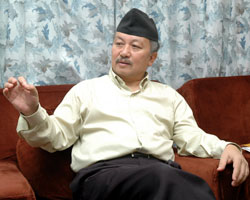|
|
It is easy to overlook parliament's dramatic transformation of Nepal's state structure since the April Uprising. But that is because parliament made it look so easy.
Using the mandate of the people power movement, the house of representatives has dismantled the powers of a feudal monarchy and pushed through progressive legislation at a breathtaking pace: vested the powers of royal succession in parliament's state affairs committee, stripped the king of his role as supreme commander of the army, declared Nepal a secular state, ordered the government to ratify the Rome Statute, and amended the citizenship act.
Critics say parliament has overstepped its mandate and is trying to substitue real progress with pseudo-radical legislation. Conspiracy-minded republicans even say dismantling the powers of the monarchy is a way to save it. The Maoists, who have no representation in parliament, have definitely felt the rug pulled from under them as the House makes decisions on issues that have always been their agenda.
The man driving this activist parliament is Speaker Subash Chandra Nembang, and he has no qualms about going too far. The soft-spoken and suave speaker has gathered a formidable reputation for integrity since he burst upon the political stage as chairman of the public accounts committee five years ago.
The committee came down hard on allegations of corruption in the lease of aircraft by then-Royal Nepal Airlines in a deal initiated by Girija Prasad Koirala when he was prime minister in 2000. Nembang did not even hesitate to investigate a minister from his own UML in another lease scandal, even though it upset his party colleagues.
Says Nembang: "What matters most to me is justice. I have taken an oath to work for the people." Nembang is a bit worried that the slew of reform legislations passed by parliament will face delays in implementation. For example, the ratification of the International Labour Organisation (ILO) convention 169 should give indigenous people more rights by law, but will it in practice?
Nembang himself comes from a line of Limbu nobility from eastern Nepal and learnt early on what discrimination does to people. His father, a lawyer, had been pro-Congress, but Nembang was attracted to communist ideology. He became a student activist during the Panchayat years, and turned towards politics as an elected MP from Ilam. He is also an attorney with 20 years of experience.
Despite being a communist, Nembang has no reservations when it comes to his own family's beliefs. His liberalism is apparent when he discloses that his wife is a fashion designer who runs Hama, a popular boutique in Durbar Marg.
While being interviewed, a group of constituents from Ilam arrive unannounced. He doesn't turn them away, and welcomes them politely. They garland him and sit down for a chat about conditions on the ground in his home district.
In a country where politicians are known for feathering their own nests, it is refreshing to come across one who has vision and is driven by a strong commitment to democracy and development.
"My job is to weaken the forces of regression and strengthen people power," says Nembang, "my job is also to ensure that the constituent assembly elections take place soon and that they are a success." The speaker is so busy, he has declined more than a dozen speaking invitations and junkets abroad to take care of things here. The peace process is still fragile, but with politicians like Nembang steering the House of Representatives there is hope. But how positive is he?
"Oh I am positive," he replies with conviction, "because the people are on our side."



